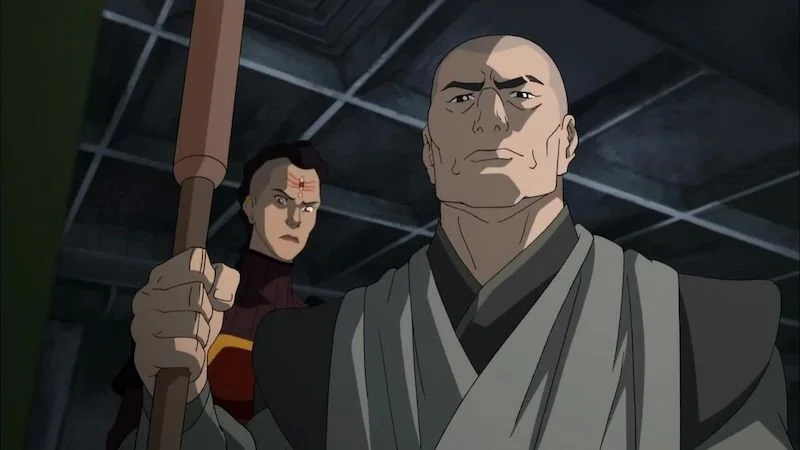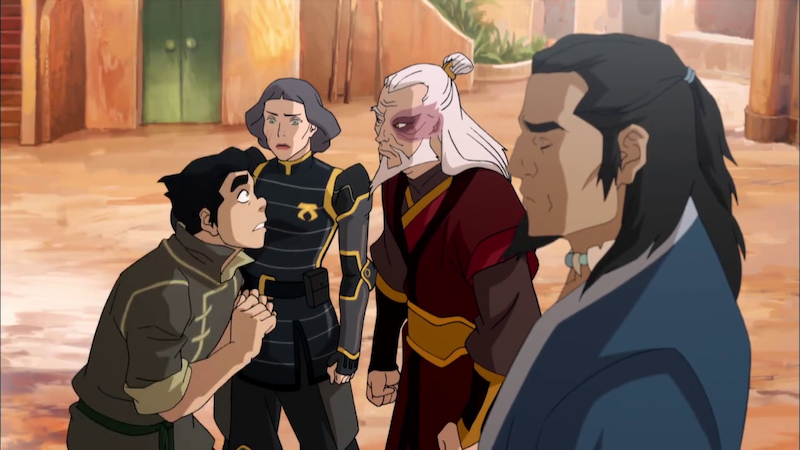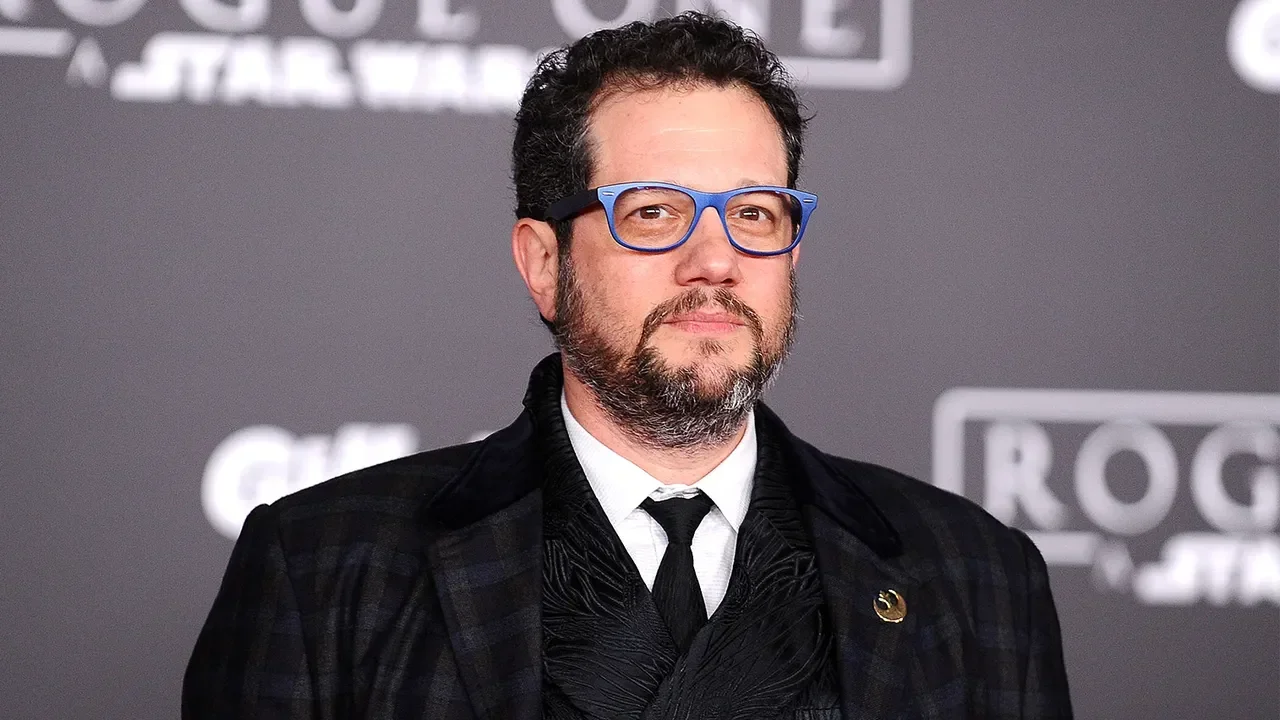How 'The Legend Of Korra' Explores The Themes Of Politics: Season Three
Image Source: YouTube
So far we’ve explored the first two seasons of The Legend of Korra and their thematic depiction of politics. Season one dealt with populism, season two dealt with religion and fascism. Korra, in these seasons, was roughed up a bit and struggled to find and rebuild herself. After she decided to leave the spirit portals open allowing for denizens of both worlds to intermingle for the first time in thousands of years, Korra seemed to have found her rhythm.
Season three changes all that.
In the third season, her decision has global ramifications. Not only are spirits now a part of the human world, but parts of the spirit world have changed the face of the human one. And, with “Change” being a fitting name for the season, people who had previously been non-benders find they have gained the power of airbending. It would seem that her decision allowed the cosmic powers that be to deem the world needed a correction, given the Fire Nation’s genocide against Airbenders around 170 years before. Korra and Tenzin and the others set off to find the airbenders and rebuild the nation that Aang had lost.
RELATED:
Unfortunately, one of those airbenders is a prisoner named Zaheer, and his radical agenda turns this season into one of the most brutal and unforgiving of the series.
P’Li and Zheer
Image Source: Polygon
Zaheer is an anarchist. Cleverly voice-cast to be played by Henry Rollins, a punk-rock musician, actor, and activist, Zaheer is a member of the Red Lotus. They are in opposition to the White Lotus, an organization dedicated to protecting the Avatar and keeping the peace of the Four Nations. Therefore, the Red Lotus wishes to end the cycle of rebirth for the Avatar, and the only way to do that is to kill the Avatar while in the Avatar state and eliminate the world’s leaders to make everyone equal. Zaheer’s issue, however, is he’ll do anything to achieve that goal, no matter how many lives it costs.
Zaheer is aided by three other benders. He is joined by P’li, his lover and a Firebender with a forehead tattoo and the ability to create explosions in a style similar to Sparky-Sparky-Boom Man from ATLA. There’s also Ming-Hua and Ghazan. Ming-Hua is a Waterbender double-amputee, missing both her arms, who uses her waterbending skills to replace her arms with water appendages. Ghazan is an Earthbender with the unique ability to also lavabend. Together they roam the world hunting the Avatar and destabilizing governments using brutal tactics and chaos. They kill the Earth Queen, sending the Earth Kingdom into chaos, and they brutalize Tenzin as he resists their machinations to kill Korra. In the end, they nearly succeed, poisoning her with mercury. The airbenders she and the others managed to assemble end up stopping Zaheer, and Suyin Beifong manages to remove most of the mercury from her system, but Korra is left a shell of the person she used to be and left infirmed by Zaheer’s attack.
Tonraq, Zuko, Lin, and Bolin discuss how to deal with Zaheer.
Image Source: Aevumus
Season three comes off as a criticism of anarchic movements. Anarchy, like its cousin Libertarianism, is a problematic ideology that like many others is not easily defined and often runs into contradictions when expressed. For example, the definition, according to the Oxford Dictionary, is twofold, and the two definitions contradict each other. One definition describes anarchy as a state of disorder due to the absence of an authority or a government. The second is an order to a society based on voluntary cooperation and no political institutions. Society, as defined, is an ordered community, and ordered implying some sort of system of rules and regulations. You can’t have rules and regulations without some sort of authoritative system that can enforce those rules and regulations, and I think you can see where this is going.
This contradiction also manifests in the show, as Zaheer is more than willing to kill world leaders, but then couldn’t care less when things devolve into chaos. After he assassinates the Earth Queen, he broadcasts to the nation that they are now free. Granted, she was a horrible monarch who couldn’t be bothered that her citizens, especially in Ba Sing Se, were reduced to abject poverty and brigandism was rampant in outlying villages, but to leave a city of millions to fend for itself without some structure of order illustrates the contradictions addressed above. Zaheer is operating on the principle that people will take care of themselves and voluntarily cooperate. The reality couldn’t be further from the truth as Ba Sing Se is literally burning as he and his compatriots leave and people begin to loot and violence breaks out. Zaheer, and many that think like him, like the idea of no authority and don’t seem to think things through, so that when they actually try to implement their “change” they take a “my-work-here-is-done” attitude and move on.
But human behavior has demonstrated and reinforced the Social Contract principle again and again, sometimes despite their best interest. The reaction to Zaheer’s actions illustrates this, as due to his reducing the Earth Kingdom into a state of anarchy, the violence and danger that follows the removal of authority structures and controls make people look for security. This power vacuum is a magnet for figures with designs for power to step in and offer a return to order and safety. People then turn a blind eye to the “unintended” consequences of supporting this person, and suddenly they find themselves under a system of fascism. That’s exactly what happens as a result of Zaheer’s actions. In season four, the Earth Kingdom is in chaos, and a former private security officer steps into the power vacuum and begins to restore order. In return for her protection, she demands fealty. If they don’t bend the knee, she rescinds her promise of protection.
Korra and friends face Zaheer’s demands to save the airbenders.
Image Source: DailyFandom
We also have to consider another issue with Zaheer and anarchism. Zaheer took the matter into his own hands and removed the Earth Queen. His actions forced the turmoil that came after onto Earth Kingdom residents whether they wanted it or not. His actions were selfish under the guise of communal altruism. There’s no doubt the Earth Queen was a horrible ruler and needed to go, but the people of the Earth Kingdom were given no choice in the matter, and more needless pain and suffering were placed on the people due to one man’s misguided and contradictory principles.
This season is one of the most popular of the series, with many people agreeing with Zaheer’s reasons. That’s the thing, Zaheer’s reasoning, being fed up with the traditional power structure and its parasitic relationship with the people they rule, is one shared by many. It’s a common thing in fiction these days: relatable villains. Thanos comes to mind. Too many, however, seem willing to ignore the problems of those like Zaheer. They’re selfish, putting their own designs over the well-being of others, imposing the world they want onto others, their opinion be damned.
The Legend of Korra is exploring one of the most glaring issues of a world that is getting more and more complicated and as a result disparity and suffering more widespread: accountability. In the face of these increasing difficulties and troubles, people search for someone to blame, and someone to fix it. The writers are ultimately shining a light on our inability to comprehend the changing world and how to deal with it.
READ NEXT:
Source(s); Fandom














